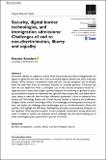Files in this item
Security, digital border technologies, and immigration admissions : challenges of and to non-discrimination, liberty and equality
Item metadata
| dc.contributor.author | Saunders, Natasha | |
| dc.date.accessioned | 2023-10-12T10:30:02Z | |
| dc.date.available | 2023-10-12T10:30:02Z | |
| dc.date.issued | 2023-10-08 | |
| dc.identifier | 293713362 | |
| dc.identifier | 2f069955-c1b4-49df-867b-546ff9c71603 | |
| dc.identifier | 85173943515 | |
| dc.identifier.citation | Saunders , N 2023 , ' Security, digital border technologies, and immigration admissions : challenges of and to non-discrimination, liberty and equality ' , European Journal of Political Theory , vol. OnlineFirst . https://doi.org/10.1177/14748851231203912 | en |
| dc.identifier.issn | 1474-8851 | |
| dc.identifier.other | ORCID: /0000-0001-7651-0902/work/144461225 | |
| dc.identifier.uri | https://hdl.handle.net/10023/28524 | |
| dc.description.abstract | Normative debates on migration control, while characterised by profound disagreement, do appear to agree that the state has at least a prima facie right to prevent the entry of security threats. While concern is sometimes raised that this ‘security exception’ can be abused, there has been little focus by normative theorists on concrete practices of security, and how we can determine what a ‘principled’ use of the security exception would be. I argue that even if states have a right to prevent migrants from entering on grounds of security, the practices required to implement this right will likely compromise core liberal democratic values in ways that have not been sufficiently appreciated. I draw on literature from Science and Technology Studies and Critical Security Studies to examine the proliferation of digital border control technologies which are increasingly dominating state security practices, and explain the challenges these technologies pose to non-discrimination, liberty and equality. I also highlight the difficulties of taking these principles as presumptive limitations on the operation of the security exception. A more sustained conversation among ethical theorists is needed to address the profound ethical challenges that the ever-increasing use of these technologies poses, particularly in pursuit of security. | |
| dc.format.extent | 21 | |
| dc.format.extent | 308395 | |
| dc.language.iso | eng | |
| dc.relation.ispartof | European Journal of Political Theory | en |
| dc.subject | Borders | en |
| dc.subject | Ethics | en |
| dc.subject | Migration | en |
| dc.subject | Security | en |
| dc.subject | Digital surveillance | en |
| dc.subject | Immigration | en |
| dc.subject | Non-discrimination | en |
| dc.subject | Liberty | en |
| dc.subject | JZ International relations | en |
| dc.subject | T-NDAS | en |
| dc.subject | SDG 10 - Reduced Inequalities | en |
| dc.subject.lcc | JZ | en |
| dc.title | Security, digital border technologies, and immigration admissions : challenges of and to non-discrimination, liberty and equality | en |
| dc.type | Journal article | en |
| dc.contributor.institution | University of St Andrews. School of International Relations | en |
| dc.contributor.institution | University of St Andrews. St Andrews Centre for the Receptions of Antiquity | en |
| dc.identifier.doi | 10.1177/14748851231203912 | |
| dc.description.status | Peer reviewed | en |
This item appears in the following Collection(s)
Items in the St Andrews Research Repository are protected by copyright, with all rights reserved, unless otherwise indicated.

